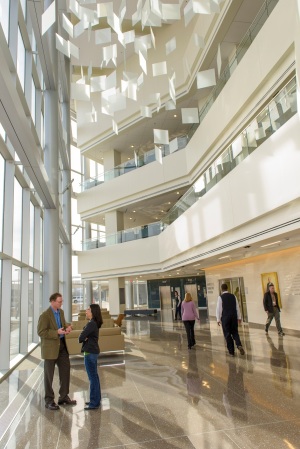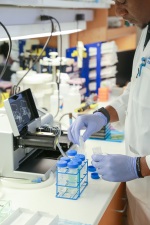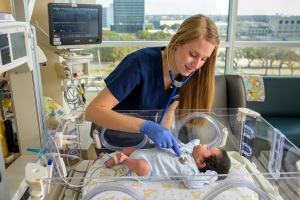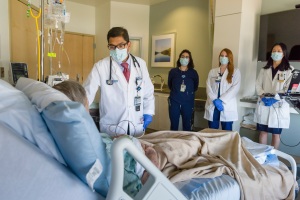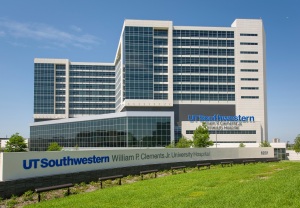Q & A with Dr. John Warner, EVP for Health System Affairs, UT Southwestern
June 28, 2019
by Sean Ruck, Contributing Editor
Dr. John Warner has a knack for keeping busy as a medical professional. He is the executive vice president for Health System Affairs at UT Southwestern Medical Center, the immediate past president of the American Heart Association and a practicing interventional cardiologist who regularly treats patients. With that background provided, we appreciate the time he took to speak with HCB News.
HCB News: What inspired you to follow a career in healthcare?
Dr. John Warner: I’m an outdoor person and always enjoyed being outside. I thought I’d be a forest ranger. Instead, I became the first physician in my family. I’m an interventional cardiologist by original career destination. I went to college thinking I would do something in science, but my father was an accountant and had a large accounting firm with lots of physicians for clients. So I was around a lot of doctors growing up and with my interest in science, my father’s friends and customers really inspired me to consider a career in medicine, and off I went.
HCB News: How long have you been with UT Southwestern?
JW: It’s been 16 years.
HCB News: What drew you to UT Southwestern?
JW: I had trained here in the early 1990s. I did my internal medicine residency and was chief resident here, then went off to Duke for my cardiology and interventional cardiology training. I joined the faculty there, then was recruited back here.
I think the things I like most about UT Southwestern is that it’s a very innovative place. It’s a very flat organization, with a very collegial approach to collaboration. Team success is always rewarded more than individual success. It’s an interesting place. It’s an organization that’s founded on its scientific underpinnings, so there’s a culture of discovery that I find is very invigorating.
HCB News: What kind of challenges does the organization have?
JW: I think a lot of organizations are moving along with this idea about caring for a population of patients and addressing the value proposition in healthcare; of being rewarded financially and reputationally more for an outcome than for a series of procedures or encounters. So it’s really focusing on quality and delivering that quality at an appropriate cost. I think that’s the challenge we’re all facing.
HCB News: What do you feel you’re best known for now, and is that what you hope to be best known for in the future?
JW: We’re on a very good path for what we want to be known for. That’s the quality of care we provide and the service you receive while getting that high quality of care. Particularly, since we opened our new hospital in 2014, we’ve been on a good journey where we’re certainly top quartile and more recently top decile in most rankings and benchmarking databases around mortality, overall quality of care and safety. In patient experience, we’ve been firmly in the top 5 percent in the country. We’re very proud of those recognitions.
HCB News: Can you talk about your patient makeup?
JW: UT Southwestern provides care in a couple of scenarios. We have our own hospitals and clinics. Our large medical group also staffs the safety net hospital, Parkland Hospital in Dallas, as well as Children’s Health right across the street. So our physicians provide the overwhelming majority — more than 95 percent — of care in those facilities as well as our own facilities. We have a footprint across the whole broad spectrum of the population of Northern Texas, meaning we care for a significant portion of managed care, but also through our work at those institutions, we care for a significant number of Medicare and Medicaid patients as well.
HCB News: An ongoing news focus is on extreme weather events. Are there any concerns, planning or training around that topic at UT Southwestern?
JW: Absolutely. Fortunately, we have not been impacted by extreme weather, but we’re sensitive to it because Texas often has its share of tornadoes and severe storms. So we do regularly train for that. We have regular drills, we prepare for lots of natural disasters knowing we’re a quaternary medical center. So not only do we have to be prepared to care for ourselves and our staff in the event of severe weather, but we’d also play a significant role in the care of the city and the surrounding area. We spend a lot of time training on that, it’s an active part of our work. We’re also a city with a large airport, so there are illnesses that come to us that we prepare for.
HCB News: Nursing and some specialties have proven hard positions to fill for some hospitals. Are you encountering any shortages when it comes to hiring?
JW: We certainly are. We’re in a growing economy here in Dallas/Fort Worth. Which means there’s a lot of people moving to the area that will be receiving care at our healthcare facilities, either primary care or care when they’re sick. So like everyone else, we’re working hard to keep up with staffing. But it’s not just nurses and physicians. It’s everything from nutrition services, to environmental services, all the support services. So we’re constantly working to attract and retain all the best employees which is difficult in an environment where there’s lots of new hotels being built, the airport is expanding. It’s a very service-oriented community and it’s growing, which means there are lots of jobs, and therefore, competition to attract the best talent.
HCB News: Are there any other unique challenges due to your location?
JW: I think our biggest challenge is not having an ocean! Sometimes it’s difficult to convince east or west coast people to give Texas a try, but once they get here they tend to like it. It’s a very cosmopolitan city, with the arts and an arts district that I think is as good as any big city’s in the country. We like it here, we have a lot of advantages — people just need to give Texas a try.
HCB News: Are there any exciting developments you’d like to highlight for UT Southwestern?
JW: We have a lot going on. We opened a new hospital in 2014. We’re adding another wing to that hospital just five years after it opened, which adds 290 more beds to it. We’re also breaking ground in June on a brand new cancer center and a new research building dedicated to research of the brain.
Brain research is an institutional priority for us. We have a large capital campaign to expand our knowledge and understanding of brain diseases and brain health. We feel strongly that this is going to be a decade of significant progress in the field, and we’re making a significant investment. The overarching umbrella is the Peter O’Donnell Jr. Brain Institute, established by a Dallas philanthropic leader to help us focus our efforts and to position the institute as a home for multidisciplinary brain health and brain disease research.
HCB News: Have you seen any upticks in any particular disease or indications among patients over the years you’ve been with UT Southwestern that impact what you’re looking for with staffing or how you’re allocating resources?
JW: The aging of America, with people living longer, means an increase in the likelihood that people will encounter illness. We’re seeing an increase in chronic diseases and certainly in diseases of the elderly. But overall, and as a cardiologist, I’m attuned to the fact that cardiovascular disease is an epidemic both here and around the world. Obesity, associated high cholesterol, diabetes and heart disease are really coming to the forefront. We’re alert to that and to the fact that we’re going to need to invest more in prevention in order to slow the growth of stroke and cardiovascular disease.
HCB News: Does your medical background give you a different perspective or approach to how you’re running things as the EVP?
JW: It does. You have committed leaders in healthcare from all walks of life, but I think that being a physician and continuing to see patients every week gives me another lens which is very helpful in terms of running our business. I feel connected to the work because I’m delivering care, I get direct feedback from patients who tell me how we’re doing, I also think I understand the work a little better in terms of what goes on and how our physicians and other staff are interacting with our electronic medical records, the challenges they’re facing. So beyond the personal satisfaction I receive in terms of practicing, I feel it connects me with the business of medicine, the delivery of healthcare and the science. It forces me to keep up, which is very valuable. I think that’s also the reason you’re seeing more physician leaders in healthcare as organizations recognize these benefits.
HCB News: Healthcare is facing the two-pronged pain of rising costs and decreasing reimbursement. Five years down the line, where do you see the industry? Where do you think it should be, and how do we get there?
JW: First of all, it’s probably the most exciting time for medicine, certainly since I’ve been alive. We’re making more improvements in healthcare than I think we’ve ever seen. That goes to the science side, where we’re treating and curing diseases that many once thought were incurable. You’re seeing that in heart and brain disease where we’re having a huge impact. So with that same impact and high-impact treatments, I think we’re also at a moment of self-awareness where we’re understanding that there are limited resources and we have to apply the best care and the best science in a way that’s cost-conscious. Don’t order tests you don’t need, make sure you’re getting as much care to people as you can.
That, I think, requires the recognition that personalizing the care of each patient will be of increasing importance. It’s not just applying healthcare with a broad brushstroke. You’re going to need to target populations of people, think about their challenges, help them be healthier and then apply these new therapeutic modalities and treatments in a very specific way. The added challenge will be to do this in an environment where we have so many new things to offer and so many new treatments evolving.
HCB News: What inspired you to follow a career in healthcare?
Dr. John Warner: I’m an outdoor person and always enjoyed being outside. I thought I’d be a forest ranger. Instead, I became the first physician in my family. I’m an interventional cardiologist by original career destination. I went to college thinking I would do something in science, but my father was an accountant and had a large accounting firm with lots of physicians for clients. So I was around a lot of doctors growing up and with my interest in science, my father’s friends and customers really inspired me to consider a career in medicine, and off I went.
HCB News: How long have you been with UT Southwestern?
JW: It’s been 16 years.
HCB News: What drew you to UT Southwestern?
JW: I had trained here in the early 1990s. I did my internal medicine residency and was chief resident here, then went off to Duke for my cardiology and interventional cardiology training. I joined the faculty there, then was recruited back here.
I think the things I like most about UT Southwestern is that it’s a very innovative place. It’s a very flat organization, with a very collegial approach to collaboration. Team success is always rewarded more than individual success. It’s an interesting place. It’s an organization that’s founded on its scientific underpinnings, so there’s a culture of discovery that I find is very invigorating.
HCB News: What kind of challenges does the organization have?
JW: I think a lot of organizations are moving along with this idea about caring for a population of patients and addressing the value proposition in healthcare; of being rewarded financially and reputationally more for an outcome than for a series of procedures or encounters. So it’s really focusing on quality and delivering that quality at an appropriate cost. I think that’s the challenge we’re all facing.
HCB News: What do you feel you’re best known for now, and is that what you hope to be best known for in the future?
JW: We’re on a very good path for what we want to be known for. That’s the quality of care we provide and the service you receive while getting that high quality of care. Particularly, since we opened our new hospital in 2014, we’ve been on a good journey where we’re certainly top quartile and more recently top decile in most rankings and benchmarking databases around mortality, overall quality of care and safety. In patient experience, we’ve been firmly in the top 5 percent in the country. We’re very proud of those recognitions.
HCB News: Can you talk about your patient makeup?
JW: UT Southwestern provides care in a couple of scenarios. We have our own hospitals and clinics. Our large medical group also staffs the safety net hospital, Parkland Hospital in Dallas, as well as Children’s Health right across the street. So our physicians provide the overwhelming majority — more than 95 percent — of care in those facilities as well as our own facilities. We have a footprint across the whole broad spectrum of the population of Northern Texas, meaning we care for a significant portion of managed care, but also through our work at those institutions, we care for a significant number of Medicare and Medicaid patients as well.
HCB News: An ongoing news focus is on extreme weather events. Are there any concerns, planning or training around that topic at UT Southwestern?
JW: Absolutely. Fortunately, we have not been impacted by extreme weather, but we’re sensitive to it because Texas often has its share of tornadoes and severe storms. So we do regularly train for that. We have regular drills, we prepare for lots of natural disasters knowing we’re a quaternary medical center. So not only do we have to be prepared to care for ourselves and our staff in the event of severe weather, but we’d also play a significant role in the care of the city and the surrounding area. We spend a lot of time training on that, it’s an active part of our work. We’re also a city with a large airport, so there are illnesses that come to us that we prepare for.
HCB News: Nursing and some specialties have proven hard positions to fill for some hospitals. Are you encountering any shortages when it comes to hiring?
JW: We certainly are. We’re in a growing economy here in Dallas/Fort Worth. Which means there’s a lot of people moving to the area that will be receiving care at our healthcare facilities, either primary care or care when they’re sick. So like everyone else, we’re working hard to keep up with staffing. But it’s not just nurses and physicians. It’s everything from nutrition services, to environmental services, all the support services. So we’re constantly working to attract and retain all the best employees which is difficult in an environment where there’s lots of new hotels being built, the airport is expanding. It’s a very service-oriented community and it’s growing, which means there are lots of jobs, and therefore, competition to attract the best talent.
HCB News: Are there any other unique challenges due to your location?
JW: I think our biggest challenge is not having an ocean! Sometimes it’s difficult to convince east or west coast people to give Texas a try, but once they get here they tend to like it. It’s a very cosmopolitan city, with the arts and an arts district that I think is as good as any big city’s in the country. We like it here, we have a lot of advantages — people just need to give Texas a try.
HCB News: Are there any exciting developments you’d like to highlight for UT Southwestern?
JW: We have a lot going on. We opened a new hospital in 2014. We’re adding another wing to that hospital just five years after it opened, which adds 290 more beds to it. We’re also breaking ground in June on a brand new cancer center and a new research building dedicated to research of the brain.
Brain research is an institutional priority for us. We have a large capital campaign to expand our knowledge and understanding of brain diseases and brain health. We feel strongly that this is going to be a decade of significant progress in the field, and we’re making a significant investment. The overarching umbrella is the Peter O’Donnell Jr. Brain Institute, established by a Dallas philanthropic leader to help us focus our efforts and to position the institute as a home for multidisciplinary brain health and brain disease research.
HCB News: Have you seen any upticks in any particular disease or indications among patients over the years you’ve been with UT Southwestern that impact what you’re looking for with staffing or how you’re allocating resources?
JW: The aging of America, with people living longer, means an increase in the likelihood that people will encounter illness. We’re seeing an increase in chronic diseases and certainly in diseases of the elderly. But overall, and as a cardiologist, I’m attuned to the fact that cardiovascular disease is an epidemic both here and around the world. Obesity, associated high cholesterol, diabetes and heart disease are really coming to the forefront. We’re alert to that and to the fact that we’re going to need to invest more in prevention in order to slow the growth of stroke and cardiovascular disease.
HCB News: Does your medical background give you a different perspective or approach to how you’re running things as the EVP?
JW: It does. You have committed leaders in healthcare from all walks of life, but I think that being a physician and continuing to see patients every week gives me another lens which is very helpful in terms of running our business. I feel connected to the work because I’m delivering care, I get direct feedback from patients who tell me how we’re doing, I also think I understand the work a little better in terms of what goes on and how our physicians and other staff are interacting with our electronic medical records, the challenges they’re facing. So beyond the personal satisfaction I receive in terms of practicing, I feel it connects me with the business of medicine, the delivery of healthcare and the science. It forces me to keep up, which is very valuable. I think that’s also the reason you’re seeing more physician leaders in healthcare as organizations recognize these benefits.
HCB News: Healthcare is facing the two-pronged pain of rising costs and decreasing reimbursement. Five years down the line, where do you see the industry? Where do you think it should be, and how do we get there?
JW: First of all, it’s probably the most exciting time for medicine, certainly since I’ve been alive. We’re making more improvements in healthcare than I think we’ve ever seen. That goes to the science side, where we’re treating and curing diseases that many once thought were incurable. You’re seeing that in heart and brain disease where we’re having a huge impact. So with that same impact and high-impact treatments, I think we’re also at a moment of self-awareness where we’re understanding that there are limited resources and we have to apply the best care and the best science in a way that’s cost-conscious. Don’t order tests you don’t need, make sure you’re getting as much care to people as you can.
That, I think, requires the recognition that personalizing the care of each patient will be of increasing importance. It’s not just applying healthcare with a broad brushstroke. You’re going to need to target populations of people, think about their challenges, help them be healthier and then apply these new therapeutic modalities and treatments in a very specific way. The added challenge will be to do this in an environment where we have so many new things to offer and so many new treatments evolving.

